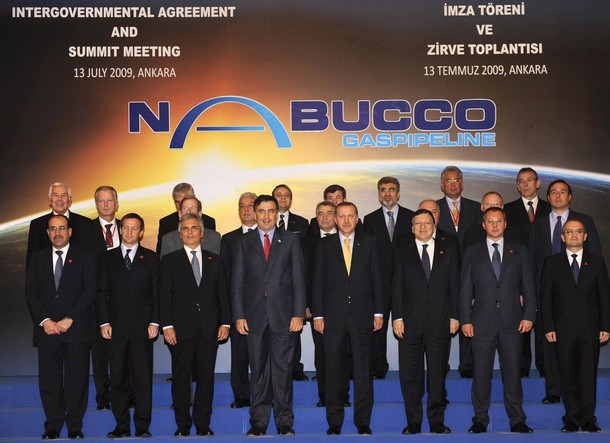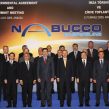
Nabucco Intergovernmental Agreement Signed in Ankara
Publication: Eurasia Daily Monitor Volume: 6 Issue: 134
By:

On July 13 the Nabucco transit countries removed an important obstacle for the strategic pipeline project. Attending a high profile meeting hosted by Turkey, the prime ministers of Austria, Bulgaria, Hungary, Romania and Turkey inked the Intergovernmental Agreement (IGA). The ceremony was also attended by several government officials and representatives of international organizations including the Iraqi Prime Minister Nouri al-Maliki, Georgian President Mikheil Saakashvili, the E.U. Commission’s President Jose Manuel Barroso, E.U. Energy Commissioner Andris Piebalgs and the U.S. special envoy for Eurasian energy Richard Morningstar (Anadolu Ajansi, July 13).
In the next step toward the completion of the legal framework, the Nabucco consortium will sign separate project support agreements with the five participating countries within the next six months. Construction work is expected to start by 2011 and the pipeline will be operational in 2014. The consortium will also open discussions with banks to raise the necessary capital and explore the marketing of transportation capacities. The project is valued at 7.9 billion Euros ($11 billion) and in its full capacity it will pump 31 billion cubic meters (bcm) of gas annually to European markets (www.nabucco-pipeline.com).
According to the Nabucco consortium, the "IGA will lay out a stable legal framework for the next 50 years and … 50 percent of the pipeline’s capacity will be reserved for the shareholders and the remaining 50 percent offered to third-party shippers." Moreover, the IGA will develop a standard tariff methodology. The legal framework set by the IGA will remain in force for 25 years after the pipeline becomes operational so that it provides "strong comfort to the potential gas supply countries who are considering selling gas to the shippers of Nabucco" (www.nabucco-pipeline.com, July 13).
The partners do not expect financing to become a major issue. The meeting signaled a possible imminent resolution over the uncertainty about securing gas to feed the Nabucco pipeline. Thus far, Azerbaijan is the only producer to commit gas to the project and it has promoted Nabucco as a strategic priority. Ahead of the signing ceremony, the head of SOCAR, Rovnag Abdullayev, reiterated support for Nabucco and maintained that Azerbaijan has enough reserves to supply alternative projects (Anadolu Ajansi, July 11).
Turkmenistan’s President Gurbanguly Berdimuhamedov expressed his readiness to export gas through Nabucco (Zaman, July 12). Representatives from Iraq, Egypt and Syria also attended the signing ceremony and pledged to pump their gas through the Nabucco once it is completed. Al-Maliki said that Iraq could start supplying 17 bcm annually to Europe by 2017 (Today’s Zaman, July 14).
Turkish officials continuously emphasized that the project is open to other potential suppliers if they wish to join. Prime Minister Recep Tayyip Erdogan reiterated Turkey’s position that Nabucco does not necessarily exclude Russia and Iran, and maintained that Qatar might also join the project.
Although Turkey has consistently expressed its interest in integrating Iran into the project, given recent political developments, this alternative currently appears unlikely. Matthew Bryza, the U.S. deputy assistant secretary of state for European and Eurasian affairs, did not rule out possible Russian participation in the project, but he expressed the Obama administration’s uneasiness over any effort to include Iran (Hurriyet Daily News, July 13). Nonetheless, given Moscow’s objections to Nabucco and the lack of Russian participation in the IGA ceremony, it remains to be seen how feasible that alternative will be.
Reinhard Mitschek, Nabucco CEO, said that in the first phase, the main suppliers will be Azerbaijan and Iraq and that Turkmen gas will be accessed in the second phase. He maintained that the market prognoses showed a greater demand from buyers than initially expected (Anadolu Ajansi, July 13).
Turkey expects to receive many benefits from the project. The transit countries will not raise fees, but will share the tax revenues proportionate to the length of the pipeline passing through their territories. Ankara projects obtaining 60 percent of the tax revenues, amounting to 450 million Euros ($630 million) annually. Moreover, the project will bring infrastructure investments to Turkey and create new jobs (Radikal, July 11). Most importantly, Turkey hailed the project as a significant development, which reaffirms its strategic value to the West. Through closer cooperation in energy security, Ankara hopes to cement its ties with the E.U. and remove the remaining obstacles to membership. Speaking at the ceremony, Erdogan and Barroso defined this new cooperation as a strategic bond and expressed their desire to see Nabucco further bolstering Turkey-E.U. ties.
Nonetheless, although Turkey previously sought to link the Nabucco project to E.U. accession and implied that progress might be conditional on the E.U. opening the energy chapter, this remains unresolved. Another potential area of uncertainty relates to whether Turkey secured its request for a 15 percent lift-off. The international press reported that Turkey might have dropped this demand. Asked about this ahead of the ceremony, the Energy Minister Taner Yildiz gave only vague answers. Yildiz said that Ankara was granted other guarantees to ensure its supply security. He indicated that Turkey might bid for the 50 percent of the gas allocated for the transport countries and added that talks with other governments and corporations on this subject will continue.
Moreover, he suggested that the pipeline will be built to enable the transportation of gas in both directions between east and west, in order that Turkey can cope with any unexpected winter shortages through swapping gas (www.ntvmsnbc.com, July 12). While Yildiz implicitly acknowledged that Turkey might have retreated from its position on the 15 percent issue, the head of the state-run gas company, BOTAS, ruled out that Turkey had abandoned its claim. "When the project support agreement is signed such details will be discussed there… This issue is still on the table: there is no sacrifice involved," Saltuk Duzyol added (ANKA, July 13).
The signing of the IGA marks a major step forward. However, such remarks, as well as the ongoing standoff in Turkish-Azeri price renegotiation talks, are indicative of the heavy bargaining that lies ahead.




